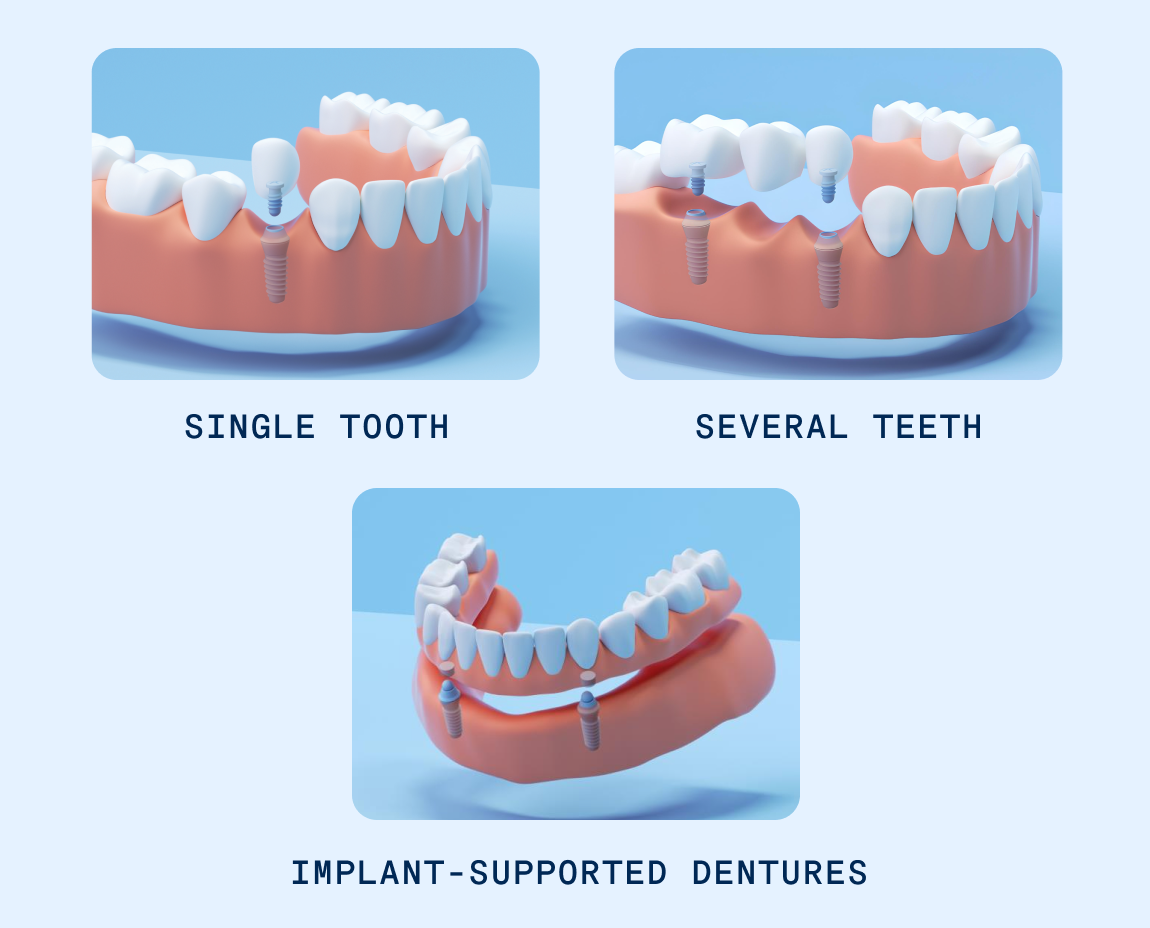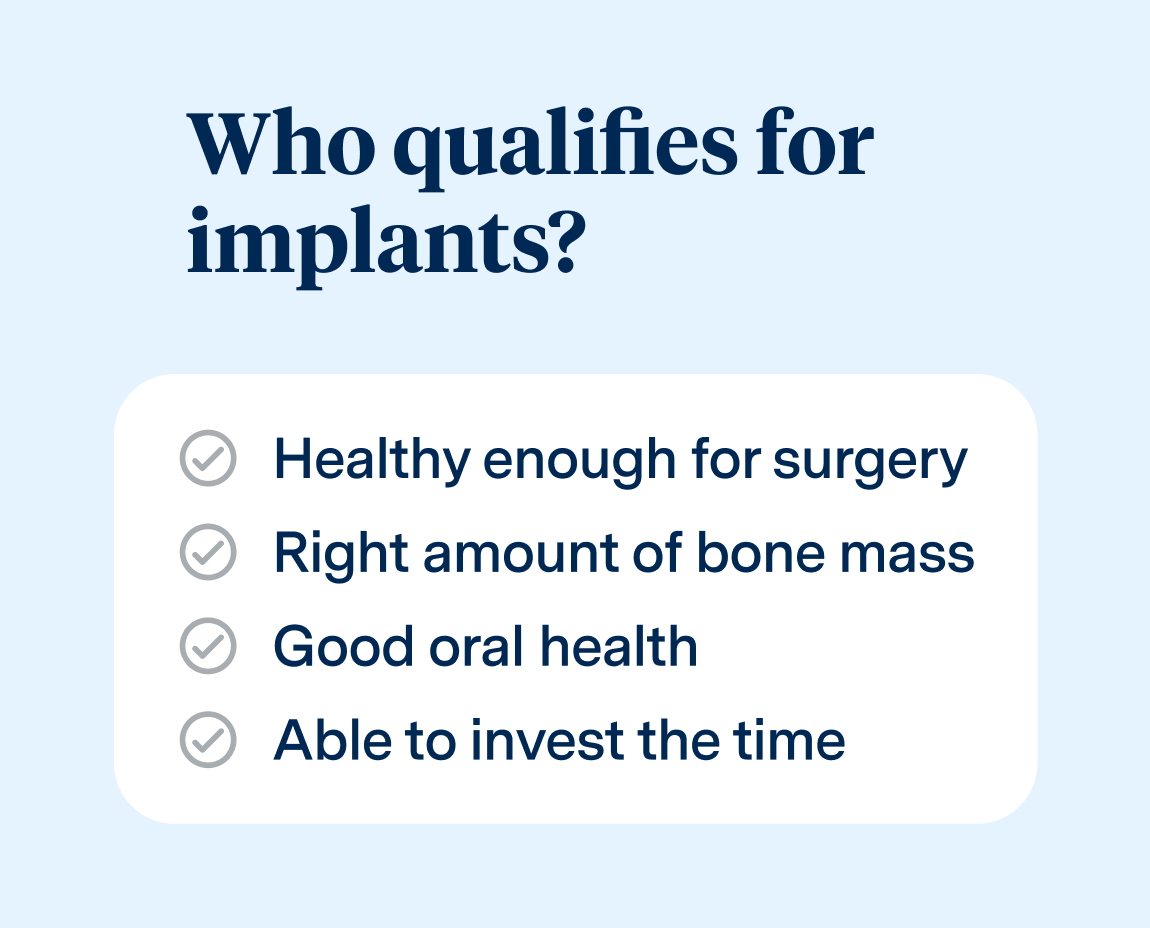The truth about dental implants in 2024
Learn about dental implants and why they're a long-lasting solution for tooth replacement, helping to restore your smile
If you’ve been struggling with missing teeth, 2024 is your year to take back your smile! Whether you’ve experienced tooth loss from gum disease, tooth decay, excessive wear and tear, or even an accident, Aspen Dental dentists recommend that you replace your missing teeth as soon as possible.
If you’ve been looking into your options, you’ve probably come across dental implants. But are you still researching what they are, and if they’re right for you? In this blog post, you’ve come to the right place. We’re going to dive into all things dental implants, and what to expect when you get them in 2024.

What are dental implants?
Learn the basics of dental implants
Dental implants are the longest lasting tooth replacement solution and are a wonderful modern advancement. Many people who are dealing with missing teeth have problems chewing and speaking and feel less confident when they smile. No matter how you lost your teeth, the good news is you can definitely do something about them! Dental implants are designed to look and function just like your natural teeth, and they are considered a stable and permanent solution.
Regardless of how many teeth you have missing, your first step will be a consultation with your Aspen Dental dentist. There, they will ensure you’re a candidate for dental implants, and customize a plan to replace your missing tooth or teeth. If dental implants area good choice for you, you and your dentist develop a plan to replace your teeth. No matter if you’re getting a single tooth or a whole arch of teeth replaced, the procedure follows a certain timeline.
You will show up at the office on the day of the oral surgery and your dentist will use a local anesthetic or sedation. Then, they will place the titanium screw-like structure into your jaw to hold everything in place. Afterwards you will need to allow the bone to heal and conform to the implant. Once this happens,you’ll return to the dentist to place the abutment and the dental crown (final tooth replacement) on the implant.
Dental implants have many benefits, such as:
They’re stable and permanent
Can prevent bone loss in your jaw
Give you back your bite and chewing ability
Are easily cleaned, just like your natural teeth
Prevent other teeth from sliding and becoming misaligned
Can restore your confidence and quality of life

Who are dental implants best for?
How do you know if you qualify for dental implants?
If you’re considering dental implants, it will be helpful to know if you would be a qualifying candidate. You and your dentist will discuss this in detail, but there are a few things you should be aware of. Here’s a list of qualifying factors.
You are healthy enough for surgery. Since the dental implants will be placed directly into the bone, you will need to be sure you’re able to have this type of oral surgery. Things that could preclude you from undergoing dental implant surgery could be diabetes, a suppressed immune system, taking blood thinners, or having a condition that could prevent your bone from healing and fusing properly with the implant.
You have the right amount of bone mass. Your dentist will take dental X-rays and do scans of your jaw to ensure that you have the amount of bone necessary to anchor the implants. If you do not, you may still be able to get dental implants by first undergoing bone graft treatment.
You have good oral health. Your overall oral health is important to ensure the meshing of the implant into your bone. If you have other dental issues, there is a higher likelihood of the implant failing. If you smoke, you should also strongly consider quitting if you’d like to qualify for dental implants.
You’re able to invest the time. Depending on your unique situation, getting dental implants can be a process. You’ll need to make sure you’re prepared to invest the time into patiently waiting for the implant to heal, as well as shoulder any upfront financial expenses. To help with this, we offer financing, flexible payment plans and our Aspen Dental Savings Plan.
Can dental implants hurt?
Will dental implant surgery be painful?
Even if you’re prepared to get dental implants, you may still have reservations about whether or not the treatment will hurt. As with any surgery, you can expect that there will be some discomfort at the site of your implant. This can surface as swelling or pain in the cheek, gumsor under the eyes. Although some discomfort typically happens following the surgery, this will start to subside as your implants heal and begin to fuse.
If you’re still experiencing pain after 10 days, it may be time to tell your dentist so they can look. You can also discuss what options you have to deal with the discomfort with your dentist before having the dental implant surgery.

How much of an investment are dental implants?
What can you expect to invest in dental implants in 2024?
Dental implants are a permanent solution to your missing teeth, but what can you expect to pay? The answer to this depends on a couple of different variables, including:
How many implants you’re getting
Where you’re having the surgery done
The level of expertise of your dentist
Your Aspen Dental’s geographical location
Because everyone’s situation is different, we suggest contacting your Aspen Dental dentist ahead of time to get an estimate. After speaking with them, you’ll have a better idea on how much the treatment will cost, and what your options are. Make sure to check with your dental insurance provider as well—they may offer helpful coverage for getting dental implants.
We hope you now know a little more about dental implants, and if you’d be a good fit for them. The first step is to schedule a consultation with your dentist and see if this permanent solution to tooth loss is for you!
Your welcome starts here
Your new patient visit to Aspen Dental is our most important appointment together.
Schedule appointment >

